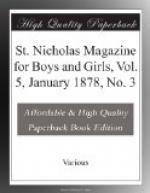(A Geometrical Jingle.)
BY ROSSITER JOHNSON.
Teddy, Jimmy, Frank, and I
Fished all day for smallest fry,
And as evening shades drew nigh,
Stopped to see if we could buy,
At a road-side groce-ry,
Anything they called a pie.
There was one, and only one,
Deeply filled and brownly done,
Warm from standing in the sun,
Flanked on each side by a bun,
Since that summer day begun.
From the window it was brought,
With our pennies it was bought;
Then a knife was quickly sought—
Who would cut it as he ought?
“Leave it all,” says Ted,
“to me,”
As the knife he flourished free;
“I have cut a great ma-ny.”
“But,” says Frank, who feared
our fate,
“Will you cut it fair and straight?”
“Straight?” says Ted.
“I’ll tell you what—
Straighter than a rifle-shot:
Straighter than the eagle’s flight.
Straight as any ray of light.”
“I will mark the place,” says
Jim—
Great exactness was his whim—
And he measured, on the rim,
Starting-points, as guides for him.
Ted put in the knife with glee;
First he cut from A to B!
Then he cut from C to D!!
Then he took the piece marked E!!!
Every cut was straight, he said,—
He would bet his curly head.
Such a perfect, born-and-bred
Geometric rogue was Ted.
[Illustration]
“CHAIRS TO MEND!”
BY ALEXANDER WAINWRIGHT.
The art of doing small things well has a good illustration in the humble chair-mender of the London streets, who is also one of the most interesting of out-door tradesmen.
He carries all his implements and materials with him. A very much worn chair is thrown over one arm as an advertisement of his occupation, and it is needed, for his cry, “Cha-ir-s to men-n-nd,” is uttered in a melancholy and indistinct, though penetrating, tone. Under the other arm he usually has a bundle of cane, split into narrow ribbons.
His look is that of forlorn respectability; his hat is greasy, and mapped with so many veins, caused by crushings, that it might have been used as a chair or, at least, a foot-stool; around his neck he wears a heavy cloth kerchief, and his long coat of by-gone fashion reaches nearly to the ankles, which are covered by shabby gaiters. He walks along at a very gentle pace and scans the windows of the houses for some sign that his services are wanted.
[Illustration: “CHAIRS TO MEND!”]
Perhaps business is dull, but in the neighborhoods where there are plenty of children he is pretty sure to find some work. Cane-seated chairs are durable, but they will not stand the rough usage of those little boys and girls who treat them as step-ladders and stamp upon them. It often happens that a neat English house-maid appears at the area railings with a chair that has a big, ragged hole in the seat, through which Master Tommy has fallen, with his boots on, in an effort to reach the gooseberry jam on the pantry shelf.




